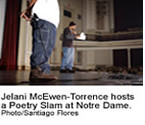
The one about a kitten in the microwave got loud groans of disbelief. The piece about Emmett Till, the young black man who was attacked and killed in 1955 after talking to a white woman in a southern convenience store, earned sustained applause. And the ditty about dirty laundry drew appreciative shouts of laughter from the Notre Dame students who had braved an icy February wind chill to listen to poetry at Washington Hall.
This was not your high school English teacher’s poetry, however. Nor was the audience your smile and applaud politely and hope-it’s-over-soon group. This was a poetry slam, a high-energy competitive performance of the spoken word that got its start at the Chicago nightclub Green Mill almost 20 years ago. Now, with the rising popularity of rap music, poetry slams are enjoying a resurgence.
While the 36th annual Sophomore Literary Festival (SLF) included the usual complement of readings from respected authors, this year’s organizers also wanted more student involvement. “One of the goals was to expand the scope of the festival while tapping into the immense talent that this University community has to offer,” says Meghan Martin, co-director of the festival.
Two of those with something a little different to offer are sophomore Jelani McEwen-Torrence and former ND student Hussein Castillo. In December 2001, the two Chicagoans and high school classmates hosted a poetry slam in the basement of Stanford Hall during finals. “Maybe 10 to 15 people showed up,” Castillo says. Okay, so it wasn’t a big success. Then a year later, the two performed at a preliminary Sophomore Literary Festival event that festival organizers called ND Unplugged. “It was amazing,” says Martin, who called the crowd “fantastically responsive.”
Thanks to that response, Martin and co-chair Joanna Cornwell wanted to make a poetry slam part of the SLF’s main calendar. McEwen-Torrence and Castillo agreed to host the event. They had a good idea of how to set it up, since the two had frequently attended The Underground, a poetry venue near Castillo’s Chicago home. They even performed there a couple times, and, says Castillo, “were greeted warmly by our peers.”
The poetry slam at the February festival was not a competition where judges from the audience award points, as happens at many slams. Instead it was an open mike slam, with students and friends of the University who had signed up earlier taking the stage to share their work. While most performers focused on social commentary —mob boss John Gotti, abortion, 9-11, minimum wage, O.J.— a few dealt with poetic concerns both comic and romantic.
“Most slam poet performances are based on hip-hop showmanship fused with conscious street poetry,” says Castillo. The students had the street poetry idea down, but most simply read their works.
It was the invited performers who gave the audience a taste of the power of slam poetry. When Keenan Pressley, a high school classmate of the hosts, added performance to his poetry as he spoke of “the syringes of hate,” he demonstrated the bite slam poetry can bring to the spoken word. While such poetry often doesn’t work on the printed page, the style of the performance can touch audience members who were bored by poetry in high school.
The slam, aficionados say, gets poetry back to the roots of its oral tradition. It also has an audience rooting for it. “The people were very inviting and cordial,” says senior Justin Wilson, who recited four of his poems. “Everyone had an open mind, which allows the poets to express themselves the best they can.”
***
Carol Schaal is managing editor of this magazine.